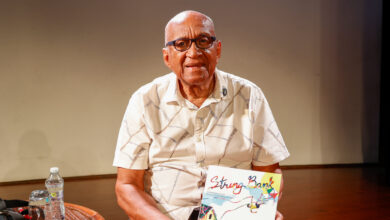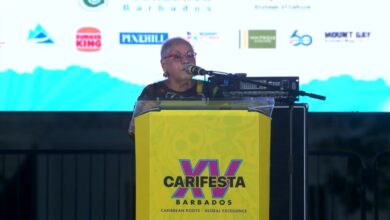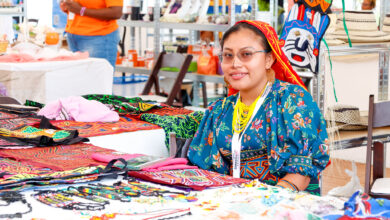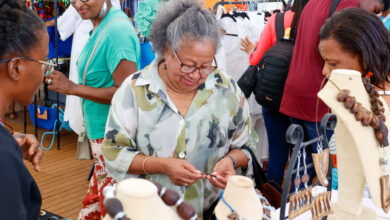(CARICOM Secretariat, Turkeyen, Greater Georgetown, Guyana) It is my pleasure and privilege to welcome Directors of Culture and other officials to this Twenty-First Meeting of the Regional Cultural Committee (RCC) on behalf of our Secretary General, His Excellency Ambassador Irwin LaRocque. I also bring very warm greetings from the Officer in Charge of the Directorate of Human and Social Development – Mrs. Myrna Bernard, who sent her regrets that she was unable to join us today due to another conflicting engagement.
For those who may not know, the Regional Cultural Committee or RCC is an important regional body within CARICOM that has and continues to provide valuable advice to Ministers of Culture on a number of issues such as cultural heritage, culture and trade, culture and the economy, and cultural policy. It has established itself over the past 22 years as a valuable regional forum where Directors of Culture meet, deliberate and propose harmonized or coordinated approaches to cultural development initiatives in the context of the CARICOM Single Market and Economy.
Our host – Suriname – is a very important partner in CARICOM in a number of areas, but today our focus is on matters related to culture. We always enjoy coming to Suriname to share in the very rich cultural traditions and expressions of the warm and talented people of this nation and I wish to thank the Government of Suriname most sincerely for so graciously hosting this meeting.
The Caribbean Community welcomes the offer of the Government of Suriname to host CARIFESTA XI in 2013 and we are all looking forward to the event with great anticipation. The RCC will spend some time during this meeting, discussing with Suriname, plans for CARIFESTA XI, beginning with logistical and promotional arrangements. We are at a crossroads in the development of this highly valued regional expose’ of Caribbean arts and culture. During the past 7 years, the Community has tried through CARIFESTA IX in Trinidad and Tobago in 2006 and CARIFESTA X in Guyana in 2008, to gradually implement the new model and approach to CARIFESTA, in keeping with the Strategic Plan for the Festival which was adopted in 2004.
The new and improved CARIFESTA seeks to address several weaknesses in the management and promotion of the event, and to ensure that it is a more dynamic, economically viable festival that meets the expectations of regional and international audiences. The new approach to CARIFESTA will provide more opportunities for professional and artistic development for the Region’s artists; will create a permanent management structure for the Festival; and will develop new income streams from the intellectual property value of the Festival through better branding and merchandising of the event.
Another major issue on the agenda of the Twenty-First Meeting of the RCC is the discussion on the Draft Regional Development Strategy and Action Plan for the Cultural Industries in CARICOM. The Third Meeting of the Regional Task Force on Cultural Industries was held from the 28th to the 30th of November, here in Suriname, just ahead of this Meeting. The Task Force, comprising representatives from governments, regional organizations and the cultural industries, met to finalise the Draft Regional Strategy.
CARICOM Governments, have increasingly been recognizing the important contribution of cultural and creative industries to the economies of the region, and have recognized that with the creation of an enabling environment with the necessary policy, legislative and institutional support, the cultural and creative industries could realize exponential growth, create jobs and wealth in the region and positively engage especially young people of the Community.
A study conducted by Professor Vanus James in 2007 in Jamaica, estimated that cultural industries contributed 4.8% to the GDP, and accounted for 32,000 jobs. And this represents only the tip of the iceberg as with more structured support, this contribution could be increased significantly.
An innovative, cutting-edge Strategy has been developed by the Task Force with the objectives of growing the regional creative economy by building more globally competitive cultural industries; creating an enabling environment to improve the competitiveness and productivity of the sector; and positioning the region as a cultural mecca and preferred investment location, while preserving and projecting our cultural diversity, our national and regional identities on the global stage. The RCC will review and discuss the Draft Strategy and make proposals for its advancement and implementation at the highest level of the Community.
Other important issues for discussion in the meeting include a number of trade related matters such as the implementation of the culture provisions of the Economic Partnership Agreement; the free movement of artists in the CSME; and the ongoing negotiations for a CARICOM-Canada Trade and Development Agreement. Cultural diversity and cultural heritage matters will also be discussed by the meeting as well as relations with a number of regional and international partners.
With respect to heritage, I would like to extend heartiest congratulations on behalf of all of us, to the Government and people of Barbados, on their success in receiving approval for the inscription of Historic Bridgetown and its Garrison on the UNESCO World Heritage List. Barbados is now only the 7th Member State to have a site inscribed on this prestigious List, which affirms the universal value of the site and highlights the space as a preferred location of international tourism.
On a more somber note, since the last meeting of the RCC, we have lost a number of cultural icons in the Community who we would like to remember and pay tribute to their sterling contribution as artists and torch-bearers for culture in CARICOM. We remember and honour:
Cultural Icon from Jamaica, Professor the Hon. Ralston “Rex” Nettleford; one of the Community’s brightest and most prolific intellectuals, and also a highly acclaimed dancer and choreographer, writer, orator, advocate, and founder of the internationally acclaimed National Dance Theatre Company, Jamaica. He died in February 2010. We remember and honour Trevor Rhone, master playwright from Jamaica, who passed away in September, 2009, at the age of 69. He was known for his mastery as a playwright, and for his co-authorship of the famous Jamaican film, The Harder They Come, and of the play Old Story Time, which has become a classic studied by students across the region for CXC – CSEC examinations. We remember and honour the internationally acclaimed calypsonian, soca artiste and performer Alphonsus Cassell, who was affectionately known to the world as The Mighty Arrow. Arrow, the pioneering artiste who put soca on the world map with his mega 1983 hit “Hot Hot Hot,” died in September, 2010 in Montserrat. His death at the age of 59 has left a huge void in the tapestry of Caribbean music and culture and signals the end of an inspiring half century of sterling contribution to this genre of music.
We remember Pat Bishop, musicologist, teacher, vocal coach, conductor of choirs, pans and orchestras, artist and accompanist par excellence from Trinidad and Tobago who passed away in August 2011. Her legacy through the world famous Lydian singers will always be treasured and remembered.
And finally we remember and honour our very near and dear Henk Tjon who passed away in September, 2009, at the age of 61. As the co-founder of the Doe-theatre, founder and artistic director of the National Theatre of Suriname and the Alakondre Dron Music Ensemble, his critical role and influence in the cultural development of Suriname and the region has been tremendous. Henk was passionate about CARIFESTA and about the cultural integration of the region. He attended and actively participated in every CARIFESTA since its inception in 1972; he served seven times as designer and artistic director of Suriname’s cultural contingent to CARIFESTA, and as Artistic Director of CARIFESTA VIII in Suriname.
We the Regional Cultural Committee honour them, we thank them for their sterling contributions, for the way in which they taught us to love, understand and appreciate ourselves and our unique identity and to be uncompromising in projecting and interpreting ourselves for the world and for future generations of this great Caribbean civilization.
I thank you all for your attention; I thank the Government of Suriname for their excellent arrangements for the meeting and wish the meeting every success in their deliberations.





